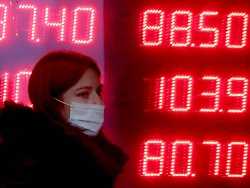Only minor losses today
Why isn’t the Russian stock market collapsing?
By Jan Ganger
03/28/2022, 18:01
Trading resumed on the Moscow Stock Exchange. After the rollercoaster ride at the end of last week, the losses are limited. There are mutliple reasons for this.
The Russian attack on Ukraine is not going according to plan at all, the West is imposing severe economic and financial sanctions – and the stock exchange in Moscow is still doing comparatively well. Today, the stock exchange allowed trading in shares of all Russian companies for the first time again, last Thursday and Friday this was only possible with papers from 33 companies. The exchange index MOEX, which is denominated in roubles, lost only 2.2 percent in the precautionary shortened trading, the RTS, which is based on US dollars, fell only 0.8 percent.
The stock exchange was closed for weeks after the start of the war on February 24. Because the shares of the gas giant Gazprom, the oil company Lukoil and the state airline Aeroflot collapsed after the Russian army invaded, which is why trading in the securities was quickly suspended.
Stock exchange operators and the central bank are now trying to release pressure from the boiler with a controlled opening. After the significant price losses on Friday, this has been achieved to some extent today.
There are several reasons why prices are not collapsing. First of all, foreigners are forbidden to sell their Russian stocks – only Russians are allowed to do so. Another point: the Russian government has announced that it will support prices. It is quite likely that the Treasury will intervene by buying shares in the market. To what extent this happens is not known.
Significant losses
In addition, short selling is currently not allowed in Moscow. With these bets on falling prices, which are completely normal and widespread on stock exchanges around the world, investors borrow shares and sell them immediately. Their calculus: the prices fall, and they can buy back the shares cheaper and return them to their owners. They pocket the difference as profit. This practice can increase the pressure on courses. It is currently unclear when these deals will be allowed again on the Russian stock exchange.
Despite all the restrictions, Russian stocks have lost a lot of value since the invasion. The MOEX plummeted around 21 percent, the RTS more than 33 percent. The airline Aeroflot collapsed by almost 48 percent. Gazprom shares fell by almost 23 percent, Lukoil shares by 15 percent. The share price of Sberbank fell by 37 percent.
The example of the major Russian bank gives an indication of the effect of the interventions by the authorities in Moscow. Sberbank shares traded in New York have plunged nearly 95 percent since the war began. They are currently suspended from trading.
